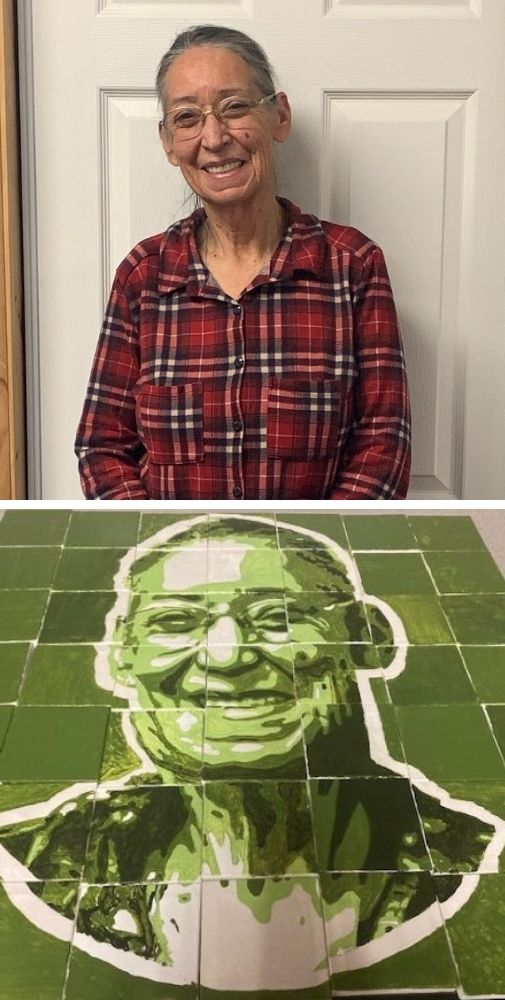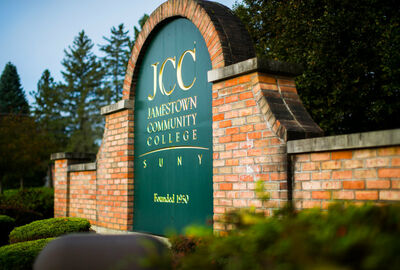A co-founder of the Faithkeepers School, Sandy Dowdy is heavily involved in the day-to-day operations of the Montessori-based school. She has dedicated much of her life to keeping alive Seneca culture, language, and history by teaching young people.
Dowdy’s determination to preserve her heritage was recognized during the Women’s Empowerment Draft in which SUNY Jamestown Community College participated in March. Of the 31 historic female icons honored in the New York statewide Women’s History Month tribute, Dowdy is one of two still living.

to create a mosaic of historic woman icon Sandy Dowdy.
Dowdy’s drive can be traced back to her first day of kindergarten at the Thomas Indian School in Irving, N.Y. in Erie County. In an interview with the Buffalo News in 2001, she said it was "the first worst day of my life,” adding: "You had to speak English, which I didn't know coming from a home where we spoke only Seneca, or you faced punishment along with ridicule.”
Over a more than a 100-year stretch that started with the introduction of Indian boarding schools in the 1850s, federal and local policies discouraged or did away with Indian languages in Native schools throughout the United States.
Dowdy and her late husband, Lehman “Dar” Dowdy, fought back in 1998 by creating the Faithkeepers School in Steamburg, N.Y. on the Allegany Reservation. At the time fewer than 200 of 7,000 registered Senecas could speak their language.
Dowdy, a Salamanca native who grew up on the Cattaraugus Reservation and later attended JCC, left her full-time teaching job at Salamanca High School for one that paid nothing. The Dowdys began the school in their home and later moved to the community center in Steamburg. By 2001, they had settled into their current building, a new cedar structure modeled after a longhouse. They raised funds to construct it on land granted by the Seneca Nation Tribal Council.
At the school, children learn to speak their native Seneca language, engage in Longhouse ceremonies, and carry on community traditions.
“She is an educator for one thing, but above all she has devoted her life to preserving the language,” said Rachael Wolfe, Dowdy’s granddaughter. “She developed the school with the idea that young children learn language the fastest, and with the hopes to build lifelong language learners.”
As one of 26 New York colleges that partnered with primary and secondary schools for the Women’s Empowerment project, students from JCC worked with peers from Salamanca City Central School District to create a mosaic painting of Dowdy on March 9 in the college’s Cattaraugus County Campus Student Union.
A dozen from Salamanca participated, including Wolfe, the high school’s Seneca language teacher.
Additionally, Dowdy’s great-granddaughters and Salamanca students Bella Wolfe, Karina Crouse and Makenize Crouse, along with Salamanca High School graduate and JCC nursing student Stephanie Benjamin, played parts in a video honoring Dowdy and her fellow female icons.
Upon being introduced as the new Seneca language teacher at Salamanca Middle and High School in 1993, the former Sandy Jimerson said: "I have been afraid for a long time that our young people would not know their own language."
Of policies to banish the Seneca language culture, Dowdy said in a 2018 interview that “we've got to get over that, we have to forge forward and keep on."
Forge on, she has.
While the Faithkeepers School receives funding from the Seneca Nation for basic operations, Dowdy and her supporters have executed fundraisers, raffles, pancake breakfasts, and more over the years to provide opportunities that connect students to their Seneca culture. Wolfe said money has been raised to build a wind tunnel for year-round planting, a barn to house animals on the campus, and a $60,000 bus to transport students.
Wolfe, who has taught Seneca language and culture at Salamanca for 17 years, has witnessed positive changes brought on by the Faithkeepers School in her own classroom. While Salamanca High School has offered regents programming in Seneca language for several years, many more students are choosing to take Wolfe’s classes.
“Our classes and schedules are getting full, which is a good problem to have,” she said.
Wolfe has noticed that former Faithkeeper students come to her classes with “a strong sense of pride in being indigenous.”
“The students who don’t have that strong cultural basis I have to really make sure that I’m focusing on building the connection with the language and culture,” she added. “But with peers that have gone through the Faithkeepers School I tend to lean on them a little bit to contribute to the class discussions and contribute to what we’re teaching and learning at the time. They’ve really become peer tutors and peer teachers.”
When Dowdy was a child, she translated Seneca conversations for her peers. In starting the Faithkeepers School, her vision was for graduates to share their own knowledge of the culture and language with the next generation, and so on.
Wolfe, for one, has taken the torch from her grandmother.
“She inspired me in a way that I built a really strong connection to not just Seneca language,” Wolfe said, “but Seneca history and all the things that she introduced me to as a student here in school that inspired my quest for knowledge further about American Indian history in general and more focused on the Haudenosaunee (Iroquois Confederacy) history and the Seneca history.
“I feel like I truly am doing what I’m supposed to do,” she added, “and I got that inspiration from her."

